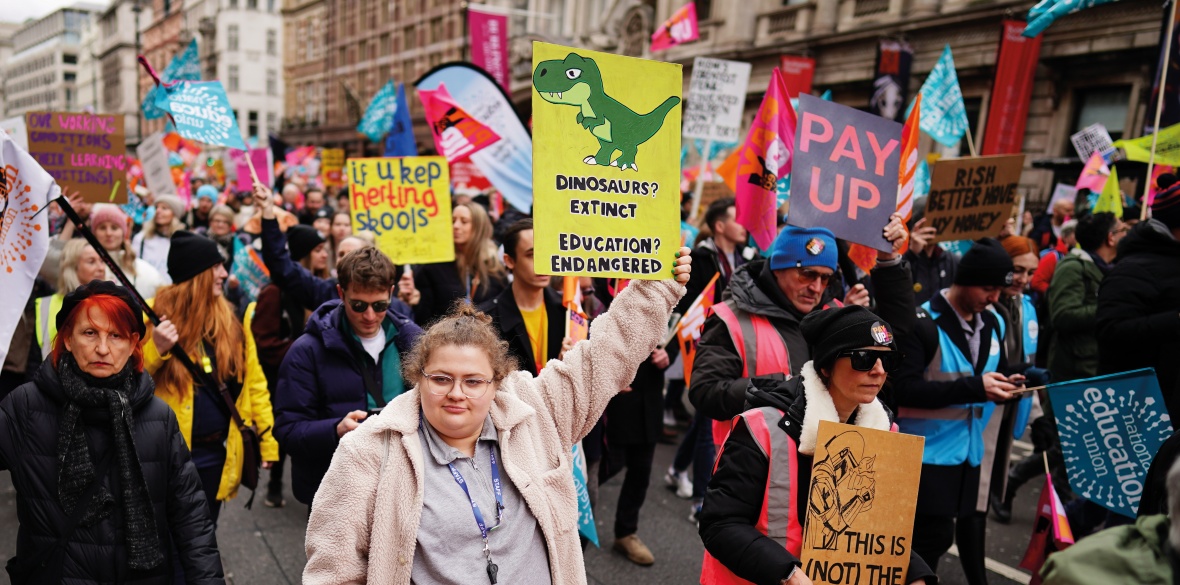This is the last article you can read this month
You can read more article this month
You can read more articles this month
Sorry your limit is up for this month
Reset on:
Please help support the Morning Star by subscribing here
AT the opening of the National Education Union (NEU) annual conference delegates were informed that 195,564 members had participated in a rapid e-consultation on the government’s pay proposals and that an enormous 191,319 (98 per cent) had voted to reject the offer.
The result is extraordinary for two reasons. First, and most obvious, is the sheer size of the numbers showing both a strength of feeling, but also a deep level of engagement by members in their union. The numbers voting exceeded the number who participated in the original industrial action ballot.
Secondly, and perhaps more importantly, the result is extraordinary for what it represents — the collective power of organised teachers combined in a union.
This is significant because it is a power that successive governments, over decades, have been determined to defeat and neutralise. In our book, Lessons in Organising, we call this the “war on teachers” and Monday’s news announcement by the NEU shows how ineffective that mobilisation by the state has been.
In Lessons in Organising we locate the war on teachers in a wider war on the working class, and specifically a war against the achievements and promise of the welfare state: a sustained and determined effort to crush the “Spirit of ’45.”
Any such campaign against the welfare state will always focus on education because the power of radical education reform poses a profound threat to the prevailing social order. As one civil servant said at the time of the Thatcher government: “People must be educated once more to know their place.”
That requires an education system that not only trains working-class kids for working-class jobs but inculcates in all of us the common sense of hierarchy, deference and compliance. It is the ideological function of education that makes it so dangerous, and why it is at the heart of the ongoing war against the welfare state.
In practical terms, the war against public education is experienced as a struggle over the curriculum, in its broadest sense. The curriculum is the terrain of the struggle over knowledge – what counts as knowledge, whose knowledge matters (or not) and who decides what knowledge is important.
These issues are so profound that they will always be a source of contestation, because the struggle over the curriculum is ultimately a struggle over the future.
However, despite its central importance, the curriculum remains no more than an abstraction. It is made real, as something that students and learners engage with and experience, through the labour of teachers and all those engaged in education work.
Only through the efforts of teachers, and the act of teaching, is the curriculum realised in a meaningful and tangible way, and that is why the struggle over the curriculum is always experienced as a struggle for the control of teachers’ work.
However, any effort to assert greater control over teachers’ work — what and how teachers teach — requires the state to seek to defeat and neutralise the source of teachers’ power, which is realised through union organisation and collective action. That is why the war on teachers has been experienced in reality as a relentless war on education unions and efforts to confront, defeat and destroy education union organisation.
In our book, we provide a detailed analysis of the war on public education, and the resultant war on teachers and their unions. We also seek to explain and understand how the NEU, and one of its predecessor unions, the National Union of Teachers, have sought to respond to profound changes such in the education system that have been introduced precisely to undermine education union organisation.
Our argument is that significant recent achievements (such as the union’s impact on the 2017 general election, and during the Covid crisis, as well as the current pay campaign) are not the serendipitous outcome of a set of favourable conditions, but are rather the consequence of an intentional strategy of union building that has been patiently worked for over more than a decade.
In Lessons in Organising we set out this story. In particular, we highlight the strategic shift to building workplace organisation, combined with a commitment to outward facing campaigning and alliance building. Not only organising in the workplace, but organising around alternatives and making sure organising within and beyond the workplace is never discrete and disconnected, but always integrated into a genuinely dialectical relationship.
Our final conclusion is that all this requires leadership, but leadership assessed by the function it performs, not the office or position held by the leader. This is a much broader conception of leadership that needs to be visible at every level of the union organisation. Re-thinking what form such leadership can take is a discussion we seek to open up in the book, and which we hope will help inform much wider debate in the movement.
Howard Stevenson is Professor of Education at the University of Nottingham and co-author, with Gawain Little, Ellie Sharp and David Wilson, of Lessons in organising: what trade unionists can learn from the war on teachers (Pluto Press).









